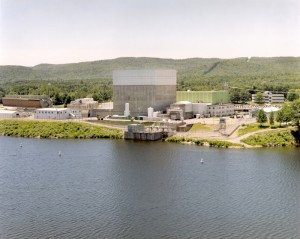By : Chris Warren.
Energy policy is the strange convergence of politics, science, and business. It’s deep and wonkish and is the kind of topic very few people understand or follow even though it effects every moment of their life. Most of these effects blend into the background. When it does come home, it hits hard. Suddenly, everyone is paying attention. It can even get a little emotional.
After over forty years of providing New England with electricity, the Vermont Yankee nuclear power station in Vernon, Vermont was disconnected from public electric grid on Monday, December 29, 2014. Yankee’s closure means 300 of the approximately 600 plant employees will be immediately laid off or retire. Most of the leftover staff will be cut in 2016. From there, a small support crew will remain to oversee a lengthy and expensive decommissioning process. The physical structure is going to be around almost long enough to become a historic landmark: It will need to sit fallow for a minimum of thirty years before the radiation in the reactor decays to a level safe enough to tear it down. It will not be completely dismantled until at least 2045, possibly longer. The price tag for the full shut down and removal is estimated at $1.25 billion, and that’s in 2014 dollars.

The Yankee closure means different things to different people. For anti-nuclear activists, it’s a sense of accomplishment after a decades-long fight even though the closure was caused by economics & policy, not protests. For the plant owner, it’s the symbol of a horribly bad investment. For the residents of Vernon, Vermont, it’s the end of an era that for better or worse permanently altered the community. Seldom heard mixed into the discussion is the story of ordinary Americans whose upended lives were powered by the economic engine that was Yankee. Employee spending at local businesses will stop, contractors who serviced the facility will have to find other revenue sources, and the primary tax base for Vernon has been, literally, unplugged.
Losing a major employer and many hundreds of jobs is devastating to a town of only a few thousand people. Beyond tangible dollars and cents is the unquantifiable loss of relationships that will be broken as people move on with their new lives. It’s hard to say goodbye to your gang of lunchroom buddies. Or the family across the street you traded favors with for years. Or the waitress at the corner diner who always knew what your order was without asking. When a town fixture fades away, so too do many routines and habits that made the place comfortable and familiar. Many of these deeply meaningful personal interactions revolved around one constant: The nuclear generating plant. And now it’s over.
I understand difficult business decisions need to be made, and I doubt even the residents of Vernon expect the plant owners should keep the place open just for nostalgia’s sake. Barely noticed in the mix of the larger energy policy universe are everyday folks who have to live with the judgements of those who don’t concern themselves with the sentiments of one small town. Going strictly on the facts, it’s not difficult to see why it was time for Vermont Yankee to go, but respect and sympathy is owed both to those who must go with it and the small town that lost its most prolific citizen.